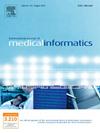Impact of patients’ personality traits on digital health Adoption Strategies for family practices
IF 3.7
2区 医学
Q2 COMPUTER SCIENCE, INFORMATION SYSTEMS
International Journal of Medical Informatics
Pub Date : 2025-03-10
DOI:10.1016/j.ijmedinf.2025.105880
引用次数: 0
Abstract
Background
Various governments highlight the relevance of digitalization in family practices; however, still some adoption barriers persist due to an inadequate understanding of why patients engage in digital use cases. Different studies show that personality traits influence how individuals assess digital use cases. Nevertheless, the effect of personality has not yet been tested in a family practice setting, even though family doctors are in an optimal position to use these personality insights via an empathetic communication approach in their direct patient interaction.
Objective
This paper aims to assess the impact of different personality traits on patients’ technology acceptance and derive implications for Digital Health Adoption Strategies of family practices – hence, what family doctors need to consider when influencing a patient’s decision to adopt a particular digital use case.
Methods
After reviewing the literature regarding the impact of personality on technology acceptance, we combined two established UTAUT and Big-Five questionnaires in a web-based survey. Recruiting a large cross-sectional sample of adults living in Germany, we conducted regression analyses to determine the effect of personality and sociodemographics on technology acceptance of four digital use cases in family practices.
Results
Our sample of 1,880 participants indicated that sociodemographics explained technology acceptance better than personality traits. Specifically, digital literacy, age and frequency of doctor visits affected people’s perception of different digital use cases while extraversion appeared as key personality trait in technology acceptance.
Conclusion
Family practices only need to consider personality traits selectively in developing Digital Health Adoption Strategies. Nevertheless, we argue that different patient personality profiles can guide family doctors in tailoring their communication while implementing digital use cases.
患者人格特征对家庭实践数字健康采用策略的影响
各国政府都强调数字化在家庭实践中的重要性;然而,由于对患者参与数字用例的原因理解不足,仍然存在一些采用障碍。不同的研究表明,性格特征会影响个人评估数字用例的方式。然而,人格的影响尚未在家庭实践环境中进行测试,即使家庭医生在直接与患者互动时通过移情沟通方法使用这些人格见解处于最佳位置。本文旨在评估不同人格特征对患者技术接受程度的影响,并得出家庭实践中数字健康采用策略的含义——因此,家庭医生在影响患者采用特定数字用例的决定时需要考虑什么。方法在回顾了有关个性对技术接受度影响的文献后,我们将两个既定的UTAUT和Big-Five问卷结合在一起进行了一项基于网络的调查。我们招募了居住在德国的成年人的大量横断面样本,进行了回归分析,以确定个性和社会人口统计学对家庭实践中四个数字用例的技术接受程度的影响。结果我们的1880名参与者的样本表明,社会人口统计学比人格特征更能解释技术接受度。具体而言,数字素养、年龄和就诊频率影响人们对不同数字用例的感知,而外向性是技术接受的关键人格特质。结论家庭实践在制定数字健康采用策略时只需要选择性地考虑人格特征。然而,我们认为不同的患者性格特征可以指导家庭医生在实施数字用例时调整他们的沟通。
本文章由计算机程序翻译,如有差异,请以英文原文为准。
求助全文
约1分钟内获得全文
求助全文
来源期刊

International Journal of Medical Informatics
医学-计算机:信息系统
CiteScore
8.90
自引率
4.10%
发文量
217
审稿时长
42 days
期刊介绍:
International Journal of Medical Informatics provides an international medium for dissemination of original results and interpretative reviews concerning the field of medical informatics. The Journal emphasizes the evaluation of systems in healthcare settings.
The scope of journal covers:
Information systems, including national or international registration systems, hospital information systems, departmental and/or physician''s office systems, document handling systems, electronic medical record systems, standardization, systems integration etc.;
Computer-aided medical decision support systems using heuristic, algorithmic and/or statistical methods as exemplified in decision theory, protocol development, artificial intelligence, etc.
Educational computer based programs pertaining to medical informatics or medicine in general;
Organizational, economic, social, clinical impact, ethical and cost-benefit aspects of IT applications in health care.
 求助内容:
求助内容: 应助结果提醒方式:
应助结果提醒方式:


